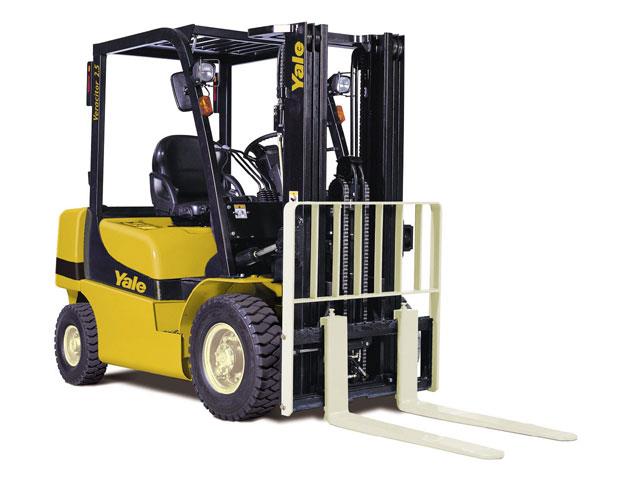 A good quality used forklift can represent far better value than certain new models on the market |
Yale Europe is the latest manufacturer to advise fleet buyers to consider used equipment as economies grow, cash flows pick up and many are turning their attention to upgrading supply chain operations and equipment.
David McIntyre, business services manager at Yale Europe Materials Handling, says operations managers should be looking at the approved used market as a first choice investment when considering their options, rather than as second best.
"The typical used forklift user has changed in recent years," he explains.
"Historically, the biggest users of used machines were small to medium-sized companies keen to increase or upgrade their fleets within a set budget. They were customers looking for a quality and reliable used product for low- to medium-usage applications.
"But financial considerations are not always the most important driver, and many large organisations now choose to invest in approved used equipment if their application warrants it.
"Customers are now very open-minded about buying used equipment, with a growing number of companies happy to order a mixed fleet of new and used products."
While Yale is pushing its Yale Approved lines, other manufacturers are also vying for used equipment sales.
"Generally speaking, the used truck business is continuously developing and a growing segment in all markets," says Heike Oder, head of trade press corporate communications at Linde.
She estimates that every second Linde used truck which is sold worldwide is Linde Approved, the factory-backed reconditioning offering.
"An Approved truck is typically one that returns to Linde from our long-term or short-term rental fleets. During this first life period, Linde has carefully looked after and maintained these trucks, meaning Linde has a complete and documented service history of each truck.
"Based on this knowledge and after a careful check on arrival, Linde selects only the most suitable ones for the Linde Approved Program. The selected trucks go through a rigorous and internationally standardised reconditioning process. Only trucks that pass this process and the final control get the 'Approved by Linde' quality label," she explains.
Chresten Gneiting, senior manager - rental and used at Toyota Material Handling Europe, explains that the Japanese industry leader also has an Approved program. "The approved used truck preparation is based on our unique knowledge of the truck and a rigorous standard check-list, providing top quality to the customer, backed up by a warranty directly from us. Every approved used truck will have been quality checked, reconditioned or refurbished by us, using genuine Toyota parts." Gneiting says sales volumes are growing in all markets. "The demand for reliable, quality second-hand machines like Toyota is high," he says, adding that marketshare continues to grow in Europe.
Growing demand for refurbished Jungheinrich trucks has been sufficient to boost the company's Used Equipment Centre Dresden subsidiary from 30 employees at start-up in 2006 to more than 150 at present.
Jungheinrich press spokesman Martin Wielgus says production last year reached 5,500 units, and this should rise to 8,000 units in 2018.
All manufacturers are stressing the value of second-hand equipment. Yale's McIntyre says: "Yale Approved Used units provide the reassurance of the full backing of a major forklift manufacturer with a proven track record in after-sales care and customer service that some of the recent low-level entrants to the forklift market simply cannot match. A good quality used forklift truck that has been fully refurbished to the relevant Yale Approved Used standards can, therefore, represent far better value than certain new models on the market.
"Typically, the running and operating costs of a Yale Approved Used unit will be similar to a new model, which means that our Approved Used units will give many additional years of productive and cost-effective service."
Linde's Oder agrees that used trucks play an important role for many companies - "not only in emerging markets, but also in industrialised countries".
"We advise customers to buy a reconditioned truck if the work load is low and a new truck would not pay off. A recommendation for used trucks also applies for fast-growing start-up companies who do not have a vast financial scope. And because customers get a high quality, robust and service-friendly truck when they invest in an Approved by Linde, they are usually better off compared to a new but low-cost truck."
Another trend Linde is seeing is the growth of mixed fleets "composed of new and reconditioned trucks to optimise their cost structure".
Jungheinrich's Wielgus attributes the rise of refurbishment to a growing rental fleet. "This increase in returned trucks is not only due to the fact that today every third truck is either rented or leased," he explains, adding that the practice of extending the life of equipment is environmentally friendly and in line with the push for sustainability. "Refurbishing a truck is significantly more protective of resources than new production."
Toyota's Gneiting doesn't favour new or used, saying "it depends on the individual need of the customer".
"Even for larger fleet users, it can make sense to place a used machine, for example, as a stand-by machine, instead of a new truck. In general, ... when trucks are less intensely utilised, a second-hand truck fulfills the need as well as a new machine," he adds.